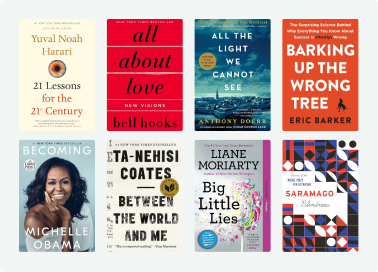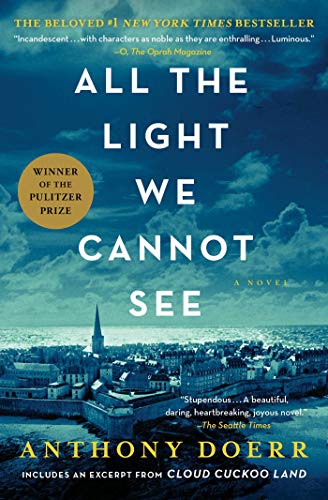The best 14 Human Nature books
Exploring the depths of human nature can be a fascinating and thought-provoking journey. To help you on this quest, we've curated a thoughtfully selected collection of books that delve into the complexities of human behavior, psychology, and society.
From evolutionary biology to social psychology, these titles offer diverse perspectives and profound insights into what makes us human. So, if you're curious about the intricacies of human nature, this book list is the perfect starting point.


What's Fahrenheit 451 about?
Fahrenheit 451 (1953) tells the tale of a near future with fireproof homes, where firemen are now tasked with the job of burning books. It’s a dystopian future, where pleasure is catered to and intellectualism has been all but extinguished. But after a chance encounter with a free spirit, one fireman starts to question the true purpose of his job.
Who should read Fahrenheit 451?
- Fans of classic literature
- Sci-fi lovers
- Anyone who enjoys a good dystopian novel

On Human Nature
What's On Human Nature about?
On Human Nature by Edward O. Wilson delves into the fundamental biological and genetic factors that influence human behavior. Wilson explores topics such as aggression, sexuality, and ethics, and examines how our evolutionary history has shaped these aspects of our nature. He argues that understanding our innate tendencies can help us address societal challenges and improve our collective well-being.
Who should read On Human Nature?
- Individuals interested in understanding the biological roots of human behavior
- Readers curious about evolutionary psychology and its implications for society
- People who enjoy thought-provoking explorations of human nature and its complexities

Flowers for Algernon
What's Flowers for Algernon about?
Flowers for Algernon is a thought-provoking novel by Daniel Keyes that delves into the complexities of human intelligence and the impact of societal expectations. Through the eyes of Charlie Gordon, a mentally disabled man who undergoes a groundbreaking experiment to increase his intelligence, the book explores themes of identity, empathy, and the ethical implications of scientific advancement. It is a poignant and unforgettable story that challenges our perceptions of what it means to be truly intelligent.
Who should read Flowers for Algernon?
- Curious individuals seeking to explore the complexities of human intelligence and consciousness
- Those interested in thought-provoking narratives that challenge perceptions and societal norms
- Readers who enjoy emotionally impactful stories that provoke introspection and empathy

The World According to Garp
What's The World According to Garp about?
The World According to Garp (1978) is a captivating novel by John Irving that delves into the life and experiences of T.S. Garp. The book explores themes of family, love, and the unpredictability of life, all through Garp's unique perspective and encounters. With its rich character development and thought-provoking plot, it is a must-read for anyone who enjoys literary fiction.
Who should read The World According to Garp?
- Readers who enjoy literary fiction with complex characters and unconventional storytelling
- Those interested in exploring the complexities of human relationships and the human condition
- People who appreciate thought-provoking and emotionally intense narratives

The Poisonwood Bible
What's The Poisonwood Bible about?
The Poisonwood Bible by Barbara Kingsolver is a compelling novel that tells the story of the Price family, who move to the Belgian Congo in 1959 as missionaries. Through the perspectives of the four Price sisters and their mother, the book explores themes of colonialism, cultural clash, and the effects of Western influence on the African continent. It is a thought-provoking and beautifully written tale of family, faith, and the consequences of our actions.
Who should read The Poisonwood Bible?
- Readers who enjoy thought-provoking and character-driven narratives
- Those interested in exploring themes of colonialism, cultural clash, and redemption
- People who appreciate rich and immersive storytelling that spans generations and continents

The Martian
What's The Martian about?
The Martian by Andy Weir follows astronaut Mark Watney, who is mistakenly left behind on Mars after a dust storm forces his crew to evacuate. With limited supplies and ingenuity, Watney must find a way to survive on the desolate planet while NASA works tirelessly to bring him home. A thrilling tale of resilience, problem-solving, and the power of the human spirit.
Who should read The Martian?
- Science enthusiasts and those curious about space exploration
- Readers who enjoy a mix of humor and gripping survival stories
- Individuals who appreciate detailed and realistic scientific explanations

Under the Dome
What's Under the Dome about?
Under the Dome is a gripping novel by Stephen King that tells the story of a small town in Maine suddenly encapsulated by a mysterious, impenetrable dome. Trapped inside, the residents must deal with dwindling resources, power struggles, and the unraveling of their community. As tensions rise and a sense of claustrophobia sets in, the book delves into themes of power, human nature, and the fight for survival.
Who should read Under the Dome?
- Readers who enjoy exploring the darker side of human nature
- Fans of supernatural and science fiction elements in their stories
- Those who appreciate complex and multi-layered character development

The Glass Castle
What's The Glass Castle about?
The Glass Castle is a memoir by Jeannette Walls that delves into her unconventional and challenging childhood. Walls recounts her experiences growing up in a dysfunctional family, constantly on the move and living in poverty. Despite the hardships, the book also explores themes of resilience, determination, and the unbreakable bond within her family.
Who should read The Glass Castle?
- Readers who enjoy memoirs and personal stories
- People looking for inspiration and resilience in the face of adversity
- Those interested in exploring themes of family dynamics, poverty, and personal growth

Ready Player One
What's Ready Player One about?
Ready Player One is a science fiction novel by Ernest Cline that takes place in a dystopian future where people escape their reality by immersing themselves in a virtual reality world called the OASIS. When the creator of the OASIS dies, he leaves behind a series of challenges that lead to an Easter egg hidden within the virtual world, and the one who finds it will inherit his fortune. The story follows teenage gamer Wade Watts as he embarks on a thrilling quest filled with 80s pop culture references, friendship, and adventure.
Who should read Ready Player One?
- Potential readers who enjoy science fiction and gaming
- Individuals looking for an immersive and imaginative story set in a virtual reality world
- Those interested in exploring themes of technology, adventure, and the power of nostalgia

Blindness
What's Blindness about?
Blindness by Jose Saramago is a thought-provoking novel that explores a world struck by a sudden epidemic of blindness. As society crumbles and the government struggles to maintain control, a group of strangers bands together to survive in a world of darkness. This gripping and haunting story delves into the depths of human nature and the resilience of the human spirit.
Who should read Blindness?
- Readers who enjoy thought-provoking and philosophical novels
- Those who are interested in exploring the darker aspects of human nature and society
- People who appreciate unique and unconventional writing styles

The Perks of Being a Wallflower
What's The Perks of Being a Wallflower about?
The Perks of Being a Wallflower by Stephen Chbosky is a poignant coming-of-age story that follows Charlie, a shy and introspective teenager. Through a series of letters, Charlie shares his experiences as he navigates high school, friendship, love, and loss. The book delves into themes of mental health, identity, and the complexities of growing up.
Who should read The Perks of Being a Wallflower?
- Teenagers and young adults navigating the ups and downs of adolescence
- Individuals who appreciate introspective and emotionally resonant storytelling
- Readers who enjoy coming-of-age narratives with complex and relatable characters

Wonder
What's Wonder about?
Wonder by R.J. Palacio is a heartwarming and thought-provoking novel that follows the story of August Pullman, a young boy born with a facial deformity. It delves into the challenges he faces as he enters a mainstream school for the first time and the impact he has on those around him. The book touches on themes of kindness, acceptance, and the beauty of being different.
Who should read Wonder?
- Readers who enjoy heartwarming and uplifting stories
- Individuals looking for insights into empathy and kindness
- Parents, educators, and children who want to understand and navigate the challenges of being different

All the Light We Cannot See
What's All the Light We Cannot See about?
All the Light We Cannot See by Anthony Doerr is a captivating novel set during World War II. It tells the story of a blind French girl and a German boy whose paths eventually cross as they navigate the chaos and destruction of the war. Filled with beautiful prose and intricate storytelling, the book explores themes of survival, humanity, and the power of connection.
Who should read All the Light We Cannot See?
- Readers who enjoy historical fiction, particularly World War II settings
- Those looking for a beautifully written and emotionally engaging story
- People who appreciate unique narrative structures and perspectives

Big Little Lies
What's Big Little Lies about?
Big Little Lies by Liane Moriarty is a gripping novel that delves into the lives of three women whose seemingly perfect lives unravel to reveal dark secrets and lies. Set in a picturesque coastal town, the book explores themes of friendship, motherhood, and domestic violence, keeping readers on the edge of their seats until the very end.
Who should read Big Little Lies?
- Readers who enjoy mystery and suspense
- People interested in exploring the complexities of female friendships and relationships
- Those looking for a thought-provoking novel that addresses societal issues such as domestic violence and bullying
Related Topics
Human Nature Books
FAQs
What's the best Human Nature book to read?
What are the Top 10 Human Nature books?
- Fahrenheit 451 by Ray Bradbury
- On Human Nature by Edward O. Wilson
- Flowers for Algernon by Daniel Keyes, Andrew Bujalski
- The World According to Garp by John Irving
- The Poisonwood Bible by Barbara Kingsolver, Barbara Fisher
- The Martian by Andy Weir
- Under the Dome by Stephen King
- The Glass Castle by Jeannette Walls
- Ready Player One by Ernest Cline
- Blindness by Jose Saramago, Giovanni Pontiero
Who are the top Human Nature book authors?
- Ray Bradbury
- Edward O. Wilson
- Daniel Keyes, Andrew Bujalski
- John Irving
- Barbara Kingsolver, Barbara Fisher